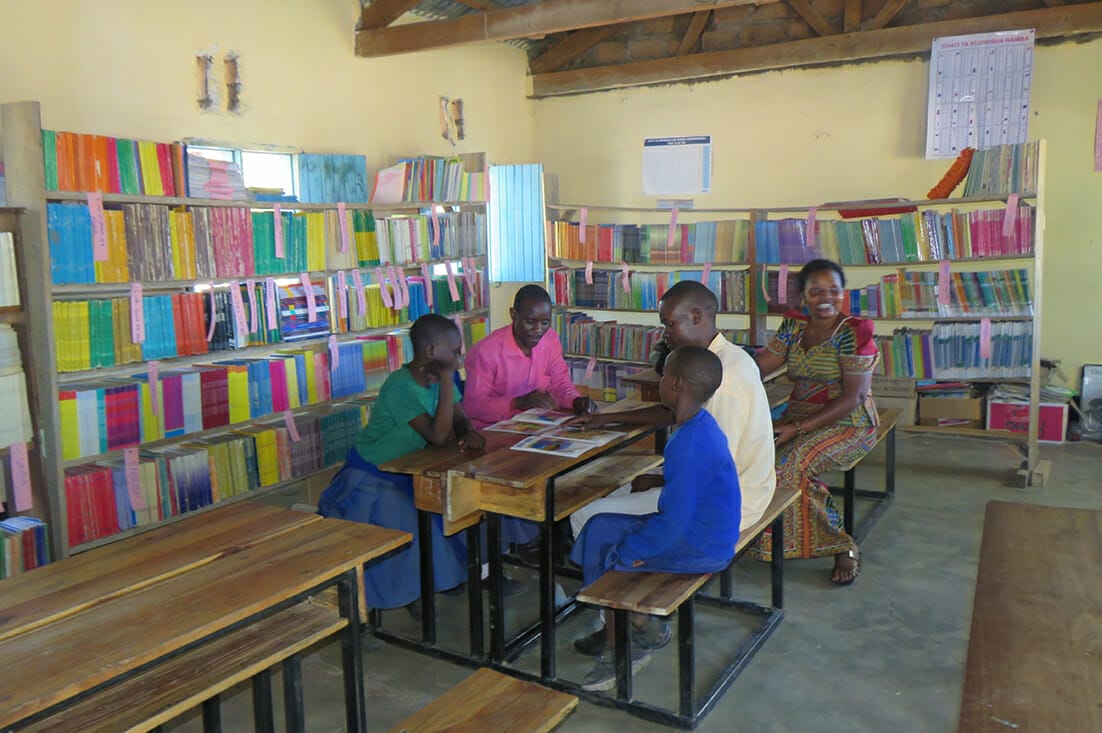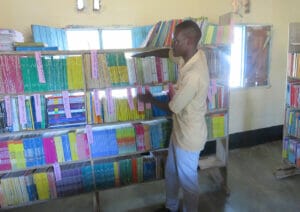News > Blog
New School Libraries Help Unlock Literacy Among Students in Tanzania
Published 04/09/2019 by Global Communities

If books open new doors to learning, then libraries hold the key. Yet, neither were within reach to students attending the schools where Project Concern International (PCI) works in the Mara Region of Tanzania.
In fact, prior to PCI’s first program interventions in 2016, none of the 231 primary schools in Bunda, Butiama and Musoma Districts had a functioning library system. The perception among teachers was that students were likely to damage borrowed books, which are costly for schools to replace. As a result, teachers elected to keep books locked away in their individual cupboards or in the head teachers’ offices, where students could not have access. In 2017, only 19% of students in grades 1 and 2 used a library in their school.
With support from the U.S. Department of Agriculture’s McGovern-Dole International Food for Education and Child Nutrition (MGD) program, PCI, in collaboration with district government officials, is working to change that mindset. Program interventions include increasing student access to books and educating communities about the benefits of establishing libraries through school leaders and committees.
To ensure libraries are well-managed, PCI trained 227 library teachers from 56 primary schools in Butiama, 100 primary schools in Bunda and 71 primary schools in Musoma on library establishment, administration and use. The training helped teachers learn how to promote reading habits among students. For example, teachers now allocate one day a week where students can borrow books from the library to read at home.

Photo by Victor Mapile/PCI
Juma Mkoji is one of 227 individuals whom PCI trained to be a library teacher in the Mara Region of Tanzania.
PCI also purchased 157,500 decodable books, which account for every student in grades 1 and 2 in the 231 project schools. These books, along with other books provided by Tanzania’s Ministry of Education, Science and Technology, provided schools with a large enough inventory to establish and maintain a library system. Library teachers are supported through supervisory visits from the District School Quality Assurers and PCI staff, which strengthens their capacity to provide high quality library management.
Currently, 222 project schools (96%) have a functioning library system, either in the form of a stand-alone room, library corner or mobile library. Recent data collection shows that almost half of students in grades 1 and 2 have borrowed library books in 2018. In addition, classroom observation assessments conducted by quality assurers indicate that 69% of students have literacy instructional materials, including textbooks and story books.
Madam Amboge Ngereja is the Head Teacher at Mugeta Primary School in Bunda District. She reported that the presence of a library has caused remarkable changes in the reading skills of grade 1 and grade 2 students. Before the library existed, 80 out of the 170 students in grade 2 (47%) struggled to read a simple Swahili sentence. After Mugeta Primary School created a library, the number of students who could not read reduced to 20 students (12%).
“I used to have many pupils in standard one and two who couldn’t read a simple sentence before,” Ngereja said. “Since the library has been established with fun story books, kids now compete to read and feel proud to tell stories to their fellow schoolmates.”
Sara Genera, 8, is one such student in grade 1 at Mugeta Primary School. After hearing her class teacher read from one of the school’s new library books, Genera took it upon herself to read the same title and gradually memorize all 14 stories inside.
“When [my friends] saw me telling the stories in class, they also became interested and we now go and read together. We enjoy being in the library,” Genera said. “My teacher also allows me to go home with a book and return the next day, so I can go read the stories with my brother. He is in Grade 4, but he doesn’t know how to read as I do.”
Juma Mkoji was trained as a library teacher and oversees the day-to-day management of Mugeta Primary School Library. He has made it a priority to share what he has learned with school administrators, teachers and the school committee to keep the new system running smoothly.
“Every day, I feel indebted to my fellow teachers, students and the head teacher for trusting me to go and attend the training,” Mkoji said. “Therefore, the only way to repay them is to make sure the library is sustainable and propels the development of reading behavior to pupils.”
To ensure all 231 project schools (100%) have a functioning library system, PCI will continue to support school committees by mobilizing community members to allocate resources such as building materials and to donate volunteer time.
Other plans for 2019 include hosting reading competitions and establishing student reading clubs. Goals are also to increase the number of students borrowing books and access to literacy instruction materials. To add to the schools’ library collections, parents will be encouraged to contribute reading materials during graduation days and the District council will continue to distribute books from the government.
Story written by Augustine Kojo with support from Juliana Dyegura, Victor Mapile, Poyo Pitalis and Hery Tindwa.




